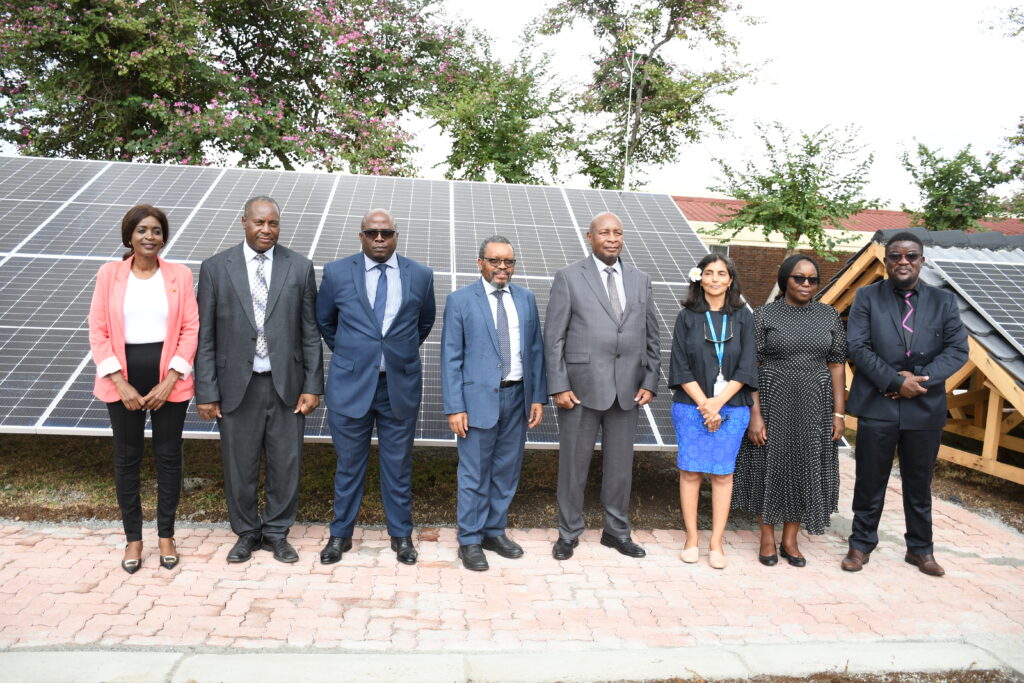
Hon. Minister of Energy and Power Development, Edgar Moyo, Group Financial Controller Mr. E.T. Chikwenhere, UNESCO Delegate, and Ms Nisha pose for a photograph
Thursday the 14th of April 2024, marked a special occasion on the ZESA calendar as the National Training Centre (NTC) received solar training equipment from the United Nations Educational, Scientific and Cultural Organisation (UNESCO), worth US$65 000, the Megawatt can report.
The equipment included laboratory solar demo kits, laboratory workshop training kits, laboratory electrical tool box and laboratory demo roof.
The collaboration between ZESA NTC and UNESCO underscores the commitment to promoting gender equality and empowering women in the energy sector. By providing equal opportunities for girls and females to access training and employment in renewable energy, the project aims to create a more inclusive and equitable society. The knowledge enhancement will foster a deeper understanding of solar photovoltaic (PV) Systems.
The project’s focus on solar PV systems, aligns with global shift towards renewable energy sources and sustainable practices.
Speaking at the handover ceremony held at the ZESA Training Centre, guest of honour, Minister of Energy and Power Development, Honourable Edgar Moyo, said the donation came at a convenient time since the government was working to achieve objectives outlined in the government’s economic blue-print, the National Development Strategy 1 (NDS1).
“This is a momentous occasion as we gather to mark the handover of solar equipment, a significant milestone in our journey towards a sustainable and electrified future. As we celebrate this great milestone, it is imperative that we reflect not only in the significance of this moment but also on the broader context within which it takes place. In doing so, we are reminded of the critical role that renewable energy plays in stepping our national development agenda as outlined in the NDS1,” Moyo said.
He added: “Zimbabwe, like many nations around the world has set ambitious goals for sustainable development goals and economic growth, guided by the principles of inclusivity and environmental stewardship.
“NDS1 underscores the strategic importance of harnessing renewable energy sources to drive socio-economic transformation and mitigate impact of climate change.
“Therefore, the handover of the solar equipment today is not merely a ceremonial act, it is a tangible manifestation of our commitment to realise the objectives outlined in NDS1.
By investing in renewable energy infrastructure and technologies, we are laying the foundation for a more sustainable and prosperous future for generations to come.
“Moreover, as we celebrate this achievement on the domestic front, it is crucial to recognise that our efforts to promote renewable energy are not isolated but are part of a larger global movement towards a low-carbon and climate-resilient future.”
UNESCO director of the regional office and representative to Zimbabwe, South Africa, Zambia, Lesotho, Botswana and Eswatini, Ms Nisha, who also spoke at the same event, said: “This is not just a ceremony, it is a direction that we are committing to support together.”
She added: “These high-end training kits in renewable energy represent more than just equipment, they symbolise our commitment to capacity building, knowledge transfer and the empowerment of technicians and graduates in the field of renewable energy.”
In a speech read on his behalf by the ZESA Group Financial Controller, Mr Eliab Chikwenhere, ZESA Executive Chairman, Dr Sydney Gata said;
“The donation will boost the capacity of the power utility. This is an important milestone in the history of ZESA. Today we are receiving solar training equipment from UNESCO, which is a result of very intensive collaborations that have been going on in the past few years.
The development comes at a very critical period in ZESA as we focus on building capacity and advancing knowledge in the field of renewable energy, particularly solar.
It is our commitment to fulfilling our key aspirations of national development strategy as we aspire to contribute to the total electrification of households in Zimbabwe.
This objective was initiated in response to the national energy requirement and the need to ensure that we leave no place and no one behind,”
Additionally, in 2023, ZESA also partnered with National University of Science and Technology (NUST) with a primary focus on solar training.
